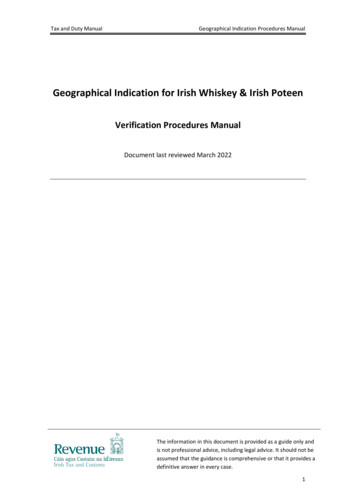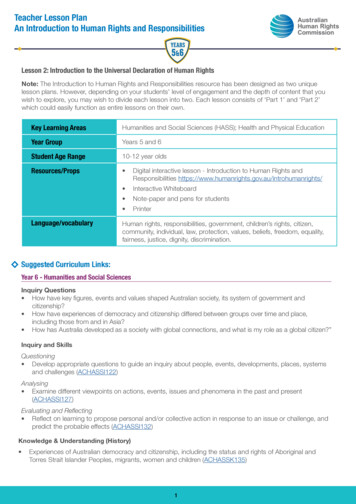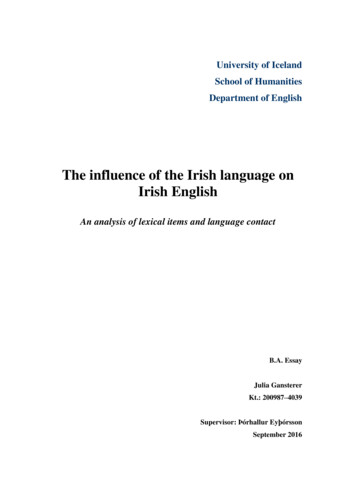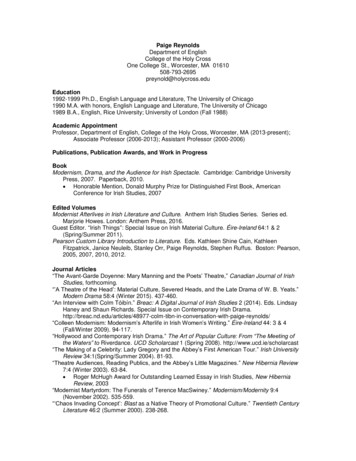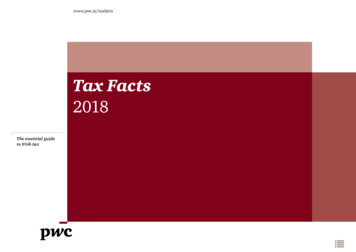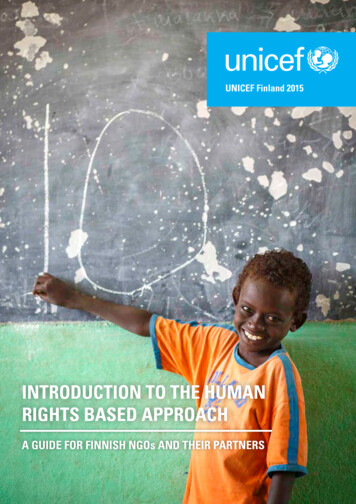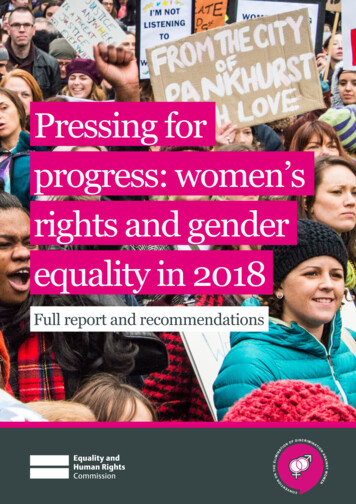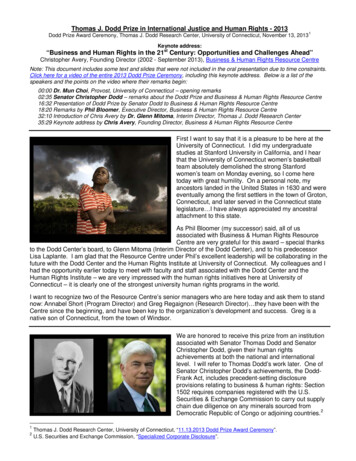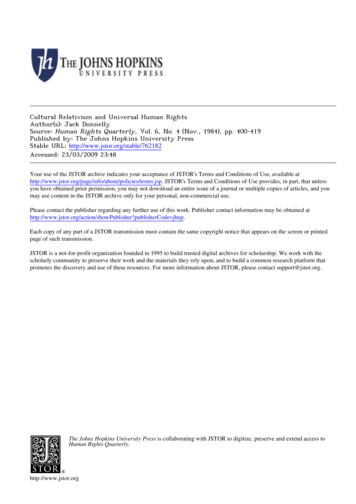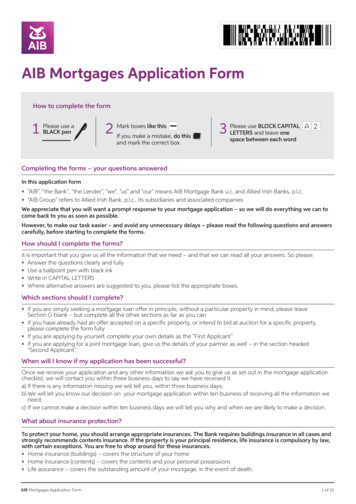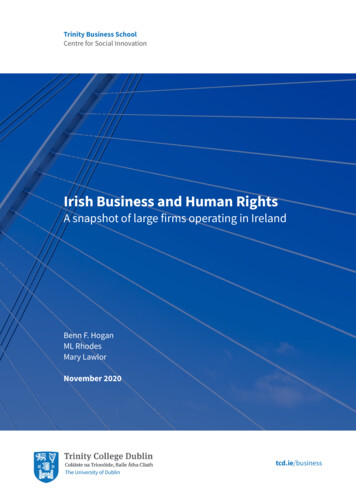
Transcription
Trinity Business SchoolCentre for Social InnovationIrish Business and Human RightsA snapshot of large firms operating in IrelandBenn F. HoganML RhodesMary LawlorNovember 2020tcd.ie/business
Executive summaryBusiness and human rights is a topic that has been on the global governance agendafor some time.Though it found its authoritative grounding in the UN Guiding Principles on Businessand Human Rights (UNGPs) almost 10 years ago, uncertainty remains over how farbusinesses and states have traveled in the interim period to ensure that respect forpeople is at the heart of business operations.This report examines the implementation of the UNGPs in Ireland. It analysespublished information from the top 50 publicly-listed firms operating in Ireland (20 ofwhom are domiciled in Ireland, alongside 30 multinational employers), with the goalof providing a comprehensive snapshot of what corporate adherence to the UNGPslooks like in practice.The report also includes a standalone analysis of the ten largest state-ownedenterprises. Given their closer proximity to government, the UNGPs suggest that statesshould take additional steps to protect against human rights abuses in suchbusinesses. We aim to examine whether this occurs in practice.Following our pilot of the methodology last year, the research applies the CorporateHuman Rights Benchmark Core UNGP Indicator Assessment to benchmark theselected firms. This methodology has been applied in a number of other Europeanjurisdictions, and is based on the established Corporate Human Rights Benchmarkmethodology of the World Benchmarking Alliance.As with our pilot study, the findings of the benchmark demonstrate there is a longroad to travel to complete fulfilment of the UNGPs by the selected companies. We findthat 88% of the Top 50 companies benchmarked score below 50% of the maximumpoints available, and that half of companies score 20% or below. We also find lowscores across the state-owned enterprises included within the research.In particular, human rights due diligence is the key area where alignment with theUNGPs is found to be severely lacking among the sample.Business certainly has room for improvement. There are also policy and legislativeoptions which the Irish government should consider, in the absence of aninternational legally binding treaty. We provide a list of recommendations, whichinclude stepping up awareness-raising among business, taking ownership of theimplementation of the UNGPs in state-owned enterprises, and delivering mandatoryhuman rights due diligence legislation at the national and European levels.1Irish Business and Human Rights
ContentsExecutive nsBHRCHRBBusiness and human rightsCorporate Human Rights BenchmarkCSICentre for Social InnovationILOInternational Labour OrganizationNAPNational Action PlanSOEState-owned enterpriseUNGPsUN Guiding Principles on Business and Human RightsAcknowledgementsThe authors would like to acknowledge the invaluable research assistance of Oisín Horgan,as well as the support of Angus Sergeant & Camille Le Pors of the Corporate Human RightsBenchmark, who generously provided of their time and data. Thanks also to our colleaguesat the Centre for Social Innovation for their inputs. Cover photo: Samuel Beckett Bridge byBen Garrett on Unsplash.Centre for Social Innovation2
Introduction‘An island at the centre of the world’.So declared TIME magazine’s cover on 24 July 2017, quoting an interview with thenTaoiseach Leo Varadkar.1 This statement was repeated in the Government of Ireland’sGlobal Ireland strategy, launched a year later.2Ireland is a highly globalised nation. The 2019 KOF Globalisation Index ranked Irelandfourth on its ‘de facto’ metrics, which consider actual international capital flows andactivities.3, 4The country is a base for the top five global so ware companies, 14 of the top 15medical technology companies, 18 of the top 25 financial services companies, all ofthe top ten pharmaceutical companies and eight of the top ten industrial automationcompanies.5 Ireland actively encourages such companies to locate in the countrythrough an industrial strategy which prizes foreign direct investment.6In addition to its relatively large footprint in global business, Ireland also has anoutsized role in global governance. The State assumes a seat on the United NationsSecurity Council for a two-year term from 2021.7 Sustainable development is one ofthe country’s priorities for its term – having been co-chair of the process thatdeveloped the UN Sustainable Development Goals in 2015.8, 9 Respect for humanrights and their advancement is a core value of Irish foreign policy.10Because of its political footprint – and its role as a supportive base for manymultinationals – Ireland presents an important context in which to examine businessand human rights (BHR).Business and human rightsThe potential for business to impact upon the rights of people – both in their ownoperations and through their supply chains – is significant. The Business and HumanRights Resource Centre is a non-profit that tracks the human rights impacts ofbusiness worldwide. It lists over 10,000 companies who have been the subject of atleast one article or report on their human rights approach in its online database.11The global understanding of the role and responsibilities of business in respect ofhuman rights has been anchored by the UN Guiding Principles on Business andHuman Rights (UNGPs) since their adoption in 2011.12 The UNGPs clarify expectationsof business vis-á-vis human rights. They provide a clear set of actions to operationalisethe ‘Protect, Respect, Remedy’ framework adopted by the Human Rights Council in2008.13Irish Business and Human Rightsft3
Box AThe UN Guiding Principles on Business andHuman RightsAdopted in 2011, the UN Guiding Principles on Business and Human Rights (UNGPs)provide clear foundations for the relationship between states, business enterprisesand human rights.They are divided into three pillars: the state duty to protect human rights; thecorporate responsibility to respect human rights; and access to remedy, as visualisedin Figure A.1.Figure A.1: Three pillars of the UN Guiding PrinciplesSource: Adapted from Shi .14The corporate responsibility to respect human rights is the primary focus of thisresearch. UNGP 15 provides that, in meeting its responsibilities under this pillar, acompany should have in place:A policy commitment to meet their responsibility to respect human rights.A human rights due diligence process to identify, prevent, mitigate andaccount for how they address their impacts on human rights.Processes to enable the remediation of any adverse human rights impactsthey cause or to which they contribute.ftCentre for Social Innovation4
Ireland’s promotion of BHR policies and practicesStates have an important role to play in promoting the UNGPs. The UN Working Groupon Business and Human Rights has encouraged states to develop National ActionPlans (NAPs) to provide for the implementation of the UNGPs in domestic contexts.15Ireland adopted its first National Plan on Business and Human Rights (2017-2020) in2017. The Irish NAP recognises the need to ‘encourage’ companies to ‘develop humanrights focused policies and reporting initiatives’, ‘conduct appropriate human rightsdue diligence’, and to consider a range of matters with respect to access to remedy,among other things.16As the implementation phase of this NAP comes to a close, this report seeks to providea baseline analysis of the position of BHR within some of the largest businessesoperating in Ireland. This compliments other e orts including the baseline assessmenton the legislative and regulatory framework and study on access to remedy that havebeen commissioned by the Department of Foreign A airs.17, 18Moving beyond ‘encouragement’ towards legislationThe UNGPs envisage a ‘smart mix’ of voluntary and mandatory measures to supporttheir implementation.19 Several states have developed approaches to these topicswhich provide an insight into possible paths forward for BHR in Ireland.The United Kingdom, Australia and the U.S. state of California have developedtransparency in supply chains legislation which requires companies to report on risksof modern slavery and human tra icking in their supply chains.20Beyond merely requiring reporting, in 2017 France adopted its Loi de vigilance, orVigilance law, which requires companies in its scope to identify human rights, healthand safety, and environmental risks and put in place a ‘vigilance plan’ to addressthese.21The European Union has announced plans to bring forward a legislative proposal onmandatory human rights and environmental due diligence for companies in early2021.22 Domestically, the Irish Coalition on Business and Human Rights is advocatingfor mandatory, gender responsive human rights and environmental due diligencelegislation.23Though there are pitfalls to seeking an empirical evaluation of the corporate respectfor human rights (see ‘Limitations’ below), we nevertheless believe the benchmarkserves as a useful tool to raise awareness of the topic in Ireland. It further o ers abaseline against which policy options to address the findings may be considered.ffffffIrish Business and Human Rightsff5
MethodologyCompany selectionThis research reports on the 50 largest public companies operating in Ireland asmeasured by turnover. This includes the 20 largest Irish-listed public limitedcompanies, as well as the 30 largest publicly-traded multinationals operating in thestate, as identified from The Irish Times Top 1000 Index in May 2020.24Given the focus of the methodology on publicly available information, we excludedprivate companies that were not subsidiaries of a publicly-traded entity.25 Weexcluded companies which operate solely in Northern Ireland, as our intention was tofocus on companies within the legislative remit of the Oireachtas (Irish legislature).26We also excluded companies that were owned, in whole or in part, by anothercompany already included in the sample,27 and a further company for lack of Englishlanguage data.28Selecting companies on the basis of turnover creates a more stable dataset than doingso on the basis of stock market capitalisation, and follows the approach taken insimilar studies using this methodology in Finland, Germany and Denmark.29, 30, 31Nevertheless, our sample is highly diverse in its relation to turnover levels andindustries covered. Per the Top 1000 methodology, all multinational companiesincluded employ sta in Ireland through one or more subsidiaries.The largest company by turnover and number of employees is Amazon.com, Inc.,which had a global turnover of 239.4 billion in 2019,32 and 798,000 employees.Paradoxically, it was the final company to be included in our analysis, ranking at 66 inthe Irish Times Top 1000 Index, which ranks companies based on their actual orestimated turnover on the island of Ireland alone.33The smallest company by turnover is Origin Enterprises plc, with a turnover of 1.798billion, while the smallest company by number of employees is Jazz Pharmaceuticalsplc, with 1,620 people employed.A table of key statistics on the companies included can be found at Table 1.The companies come from a range of sectors, though health care and technologycompanies make up over half of the sample, reflecting Ireland’s status as a Europeanbase for many companies in these sectors. A full breakdown is available at Table 2.ffCentre for Social Innovation6
Table 1: Top 50 public companies by turnover7Turnover(EUR m)Number ofEmployeesTechnology222,070137,000Alphabet Inc. (Google)Communications138,152118,8993Microsoft CorporationTechnology122,070163,0004Johnson Controls International plcIndustrials20,458104,0005Medtronic plcHealth Care24,679104,9506Facebook Inc.Communications60,34344,9427CRH plcMaterials25,12980,2518Eaton Corporation plcIndustrials18,257101,0009DCC plcEnergy16,38412,77310Trane Technologies plcIndustrials14,16850,00011AbbVie Inc.*Health Care28,39430,00013Takeda Pharmaceutical Company Limited†Health Care14,74047,49514Dell Technologies Inc.Technology78,658165,00015Merck & Co., Inc. (MSD)Health Care39,98071,00016Smurfit Kappa Group plcMaterials9,04846,56317Ardagh Group S.A.Materials5,68516,30018Oracle CorporationTechnology33,346135,00019Ryanair Holdings plcConsumer Disc.8,49517,94220Pfizer Inc.Health Care44,17188,30021Kerry Group plcConsumer Staples7,24126,09023Total Produce plcConsumer Staples6,1736,00524Western Digital CorporationTechnology14,28563,80026Associated British Foods plc(Primark/Penneys)Consumer Staples17,571138,09727Kingspan Group plcMaterials4,65914,52928Experian plcTechnology4,42117,32429Perrigo Company plcHealth Care4,12911,20031Boston Scientific CorporationHealth Care9,16336,00032Glanbia plcConsumer Staples3,8764,542#CompanySector1Apple Inc.2Irish Business and Human Rights
34Adobe Inc.Technology9,53522,63436Microchip Technology Inc.Technology4,50218,00038Applegreen plcEnergy3,07311,06939Grafton Group plcConsumer Disc.2,96712,96141Abbott LaboratoriesHealth Care27,231107,00042Intel CorporationTechnology61,425110,80043Mallinckrodt Pharmaceuticals plcHealth Care2,7003,40044Tesco plcConsumer Staples71,908293,96345Alimentation Couche-Tard Inc.(Circle K Ireland Energy Group)Consumer Staples46,20413100046Icon plcHealth Care2,39514,65047Flutter Entertainment plcConsumer Disc.2,3768,89049Alexion Pharmaceuticals Inc.Health Care4,2593,08251Maxim Integrated Products Inc.‡Technology1,8707,11553Gilead Sciences Inc.Health Care19,16111,80054International Consolidated Airlines GroupS.A. (IAG) (Aer Lingus)Consumer Staples25,50666,03458Jazz Pharmaceuticals plcHealth Care1,8451,62059Becton, Dickinson and Company (BD)Health Care14,75870,09361Valero Energy CorporationEnergy92,45910,22262Origin Enterprises plcConsumer Staples1,7982,53563Diageo plcConsumer Staples21,42428,42065Salesforce.com, Inc.Technology14,59449,00066Amazon.com, Inc.Technology239,438798,000Notes:# Company's position in the Irish Times Top 1000 Index as of May 2020. Gaps in the numbering refer to companies excluded from thesample, owing to their being private companies, or subsidiaries of other companies already included.Flags refer to country of domicile: Ardagh Group is registered in Luxembourg, Experian is domiciled in Jersey, IAG is jointly registered inEngland and Wales (U.K.) and Spain, and Takeda is registered in Japan.34Names in brackets refer to the primary brand under which the company in question operates in Ireland.‘Consumer Disc.’ Is an abbreviation for the Consumer Discretionary sector.* On 8 May 2020, AbbVie Inc. acquired Allergan plc.35 The latter company is included at #11 on the Irish Times Top 1000 Index. As the newowner of Allergan, AbbVie was included in the analysis.† On 8 January 2019, Takeda Pharmaceutical Company Limited (‘Takeda’) acquired Shire plc.36 The latter company is included at #13 onthe Irish Times Top 1000 Index. The latest accounts filed by Shire Pharmaceuticals Ireland Limited (whose ultimate owner is Takeda)showed a turnover of 1,797.9 million, placing the company within the scope of this research.‡ On 13 July 2020, Analog Devices, Inc. announced its intention to acquire Maxim Integrated Products, Inc. The transaction is expectedto close in summer 2021, subject to regulatory and shareholder approval.37Centre for Social Innovation8
Table 2: Sectors included in ‘Top 50’ sampleSectoral classification# ofSectoral classificationcompanies# ofcompaniesCommunications2Health Care14Consumer Discretionary3Industrials3Consumer Staples9Materials4Energy3Technology12Research methodologyFollowing the research pilot completed in 2019,38 we utilised the Corporate HumanRights Benchmark’s (CHRB) Core UNGP Indicator Assessment methodology.39This methodology was selected – following a review of a range of benchmarkingapproaches – due to its transparency, relative simplicity and comparabilityworldwide.40The methodology is drawn from the ‘full’ CHRB benchmarking methodology, whichwas first applied in 2017 following a two year multi-stakeholder development andpiloting process.41The Centre for Social Innovation (CSI) has been utilising pilot versions of the CoreUNGP Indicator Assessment since 2018, and have benefited from substantialengagement with the CHRB research team over that period. This year, the CHRBfacilitated initial training on the methodology and provided opportunities to engagewith other researchers across the EU who were also applying the methodology.The indicators used in this assessment are focused on the UNGPs. They rely onpublicly available information disclosed by companies, across three thematic areas:Governance and Policy Commitments; Embedding Respect and Human Rights DueDiligence; and Remedies and Grievance Mechanisms. These three themes cover theUNGPs’ three key ‘asks’ of business (see Box A, above).Applying the Core UNGP Indicator AssessmentAn overview of the thirteen indicators which form part of the Core UNGP IndicatorAssessment, including the scores available for each indicator, can be found in Table 3.Gaps in the indicator numbering reflect the fact these indicators are a subset of the‘full’ CHRB methodology.For each indicator, a company may score between 0 and 2. A score of 1 indicates that acompany has met the basic requirements of the indicator; a score of 2 means that thecompany has gone beyond these.9Irish Business and Human Rights
Partial scores are also available where the scoring requirements are partially achieved,as detailed in Table 3. Where a company has not met all the criteria for Score One buthas met at least one or more of the requirements for Score Two, a half point may beawarded in all instances.Table 3: List of indicatorsAvailable scoresTheme A: Governance and Policy CommitmentsMaximum score:8A.1.1 Commitment to respect human rights02A.1.2Commitment to respect the human rights ofworkers10 0.5 1 1.5 2A.1.4 Commitment to engage with stakeholders012A.1.5 Commitment to remedy01 1.5 2Theme B: Embedding Respect and Human Rights Due DiligenceMaximum score:12B.1.1Embedding - Responsibility and resources for day-to-dayhuman rights functions0B.2.1HRDD - Identifying: Processes and triggers for identifyinghuman rights risks and impacts0 0.5 1 1.5 2B.2.2HRDD - Assessing: Assessment of risks and impacts identified(salient risks and key industry risks)0 0.5 12B.2.3HRDD - Integrating and Acting: Integrating assessmentfindings internally and taking appropriate action0 0.5 12B.2.4HRDD - Tracking: Monitoring and evaluating the effectivenessof actions to respond to human rights risks and impacts02B.2.5HRDD - Communicating: Accounting for how human rightsimpacts are addressed0 0.5 1 1.5 2Theme C: Remedies and Grievance Mechanisms1 1.5 21Maximum score:6C.1Grievance channels/mechanisms to receive complaints orconcerns from workers01 1.5 2C.2Grievance channels/mechanisms to receive complaints orconcerns from external individuals and communities01 1.5 2C.7Remedying adverse impacts and incorporating lessonslearned01 1.5 2Source: Corporate Human Rights Benchmark.42Quality assurance and engagementAll companies benchmarked by the CSI were assessed against the methodology by theresearch team between June and August 2020. The researchers held weekly meetingsto discuss progress and review borderline cases.Centre for Social Innovation10
Twelve companies in the sample overlapped with the CHRB’s own benchmark samplefor 2020. The research team capitalised on this overlap, using it to ensure alignmentbetween the present study and the CHRB's own benchmark of 230 global companies.43Five of the overlapping companies were jointly assessed, and the respective resultswere compared to identify areas where there was a divergence in the application ofthe methodology. The scores for all companies were then aligned to ensureconsistency.All companies included within the scope of the benchmark were contacted by eitherthe CSI or the CHRB to inform them of their inclusion in the study, and to provide themwith an opportunity to comment on their dra scorecard and/or identify publiclyavailable information that may not have been located by the research team.In the case of the sample benchmarked by the CSI, we received responses from and/orengaged with 39% of companies. In all, when the companies who engaged with theCHRB are included, 52% of companies in the ‘Top 50’ sample engaged withresearchers. Information received through this process was used to refine theassessment and produce the final results presented in this report.The CSI also participated in a collaborative session with members of other nationalsnapshot research teams across the EU to identify common trends and challenges.Irish Business and Human Rightsft11
State-owned enterprisesThe UNGPs recognise that states have ‘greatest means within their powers to ensurethat relevant policies, legislation and regulation regarding respect for human rightsare implemented’ within state-owned enterprises (SOEs).44 Guiding Principle 4 statesthis in clear terms:“4. States should take additional steps to protect against human rights abusesby business enterprises that are owned or controlled by the State, or that receivesubstantial support and services from State agencies such as export creditagencies and o cial investment insurance or guarantee agencies, including,where appropriate, by requiring human rights due diligence.”Accordingly, in order to provide a benchmark for the State in this regard, we have alsoincluded the top 10 state-owned enterprises by turnover. These companies aredi erent in scale and structure to the Top 50 publicly-listed companies operating inIreland, given their operations are, by and large, within the State. We report results forthese companies separately.Relevant organisations were identified through the April 2020 CSO Register of PublicSector Bodies,45 and turnover was taken from the last published annual report of eachbody as of April 2020. The following SOEs are included:Table 4: State-owned enterprise sampleTurnover(EUR m)Number ofEmployeesElectricity Supply Board3,4327,9742Allied Irish Banks plc2,8749,5203VHI1,5641,4514C ras Iompair ireann1,31510,0465An Post8979,7516DAA plc8974,1397Eirgrid plc7585168Ervia4871,1449Permanent TSB plc4422,38610Bord na M na3951,831#Company1ffiÉóffCentre for Social Innovationó Box B12
FindingsCompany resultsWhile there are some notable outliers, 88% of the companies benchmarked achieved ascore below 50% of the maximum available. Half of the companies achieved abenchmark score of 20% or below.Two companies – Tesco plc and Diageo plc – led the way, scoring 83% and 71%respectively. Two Irish-registered companies – Kerry Group plc and CRH plc – join U.S.domiciled technology companies Intel Corporation and Microso Corporation in the50-60% band. The full distribution of companies is shown in Figure 1.Figure 1: Company scores, by percentage 040-5050-6060-7090-100The scores achieved on a company-by-company basis can be found in Table 3. A fulltable showing the scores achieved on each theme is included in the Annex.Irish Business and Human Rightsft13
Table 3: Company scoresCompanyTheme A [8]Theme B [12]Theme C [6]Total [26]Tesco21.5Diageo18.5Kerry nson Controls International!9.5Smurfit Kappa Group!9.5Associated British Foods9Takeda9Western Digital9Dell Technologies8Boston ScientificEaton Corporation7.5!7.5Apple7Merck & Co. 6Ardagh Group6Glanbia!6Maxim Integrated Products!6Abbott Laboratories!5.5BD!5IAG5Trane Technologies5AbbVieCentre for Social Innovation!4.514
Origin EnterprisesAlexion Pharmaceuticals4.5!4DCC4Facebook4Flutter Entertainment!4Jazz Pharmaceuticals!4Mallinckrodt Pharmaceuticals!4Oracle!4Adobe!3.5Alimentation Couche-Tard!3.5Experian!3.5Grafton Group!3.5Icon!3Microchip Technology!3Perrigo CompanyGilead Sciences3!Total Produce2.52.5Valero Energy!2.5Kingspan Group!2Ryanair Holdings!1.5Applegreen!1Notes:! Company scored zero on the human rights due diligence indicators, B.2.1–B.2.5.15Irish Business and Human Rights
Results by indicatorAt the sample level, average scores by indicator were low across the board, with thehighest average scores being for Theme C – Remedy & Grievance Mechanisms, and thelowest for Theme B – Embedding Respect & Human Rights Due Diligence. Figure 2shows average scores across all indicators.Figure 2: Average scores by .1.1A.1.2A.1.4A.1.5Governance & g Respect &Human Rights Due Diligence0.190.06B.2.5C.1C.2C.7Remedy &Grievance MechanismsTable 4 presents the full distribution of scores by indicator. There are just threeindicators on which the majority of companies scored 1 or above. These are thecommitment to respect human rights (A.1.1), the commitment to engage withstakeholders (A.1.4), and the indicator tracking grievance mechanisms or channels toreceive complaints from workers (C.1). A majority of companies scored 0.5 for thecommitment to respect the human rights of workers (A.1.2). This primarily relates toscores obtained by companies for commitments in relation to health and safety.Centre for Social Innovation16
Table 4: Distribution of scores by indicatorScore 4%8%–Theme A:Governance and policy commitmentsTheme A consists of four indicators, which consider specific commitments made bycompanies to respect human rights; respect the human rights of workers; engage withstakeholders; and to provide remedy for adverse impacts the company causes,contributes, or is directly linked to.Developing a policy commitment is the first operational principle of the corporateresponsibility to respect human rights articulated in the UNGPs.46The average score for this theme was 2.79 of a possible 8 points (34.9%).Figure 3 visualises the distribution of scores across the indicators in this theme. Higherscores are noted on A.1.1 (commitment to respect human rights) and A.1.4(commitment to stakeholder engagement). However, the majority of companiesscored 0.5 or below in the case of A.1.2 (commitment to respect the human rights ofworkers), and 0 in the case of A.1.5 (commitment to remedy).17Irish Business and Human Rights
Figure 3: Distribution of scores for Theme 1.1: Commitment to respect human rightsScore One requires a company to have in place a publicly available statementcommitting it to respect human rights. Score Two requires a specific commitment tothe UNGPs or the OECD Guidelines for Multinational Enterprises.A.1.1 was the second-highest scoring indicator in the analysis as a whole; 74% ofcompanies scored 1 or above.The methodology has strict requirements around what constitutes wording su icientto amount to a commitment. 13 companies did not meet any of the requirements ofthis indicator, either because no human rights commitment was identified, or becausethe wording of the statement identified was not su iciently robust to be considered acommitment according to the methodology.A.1.2: Commitment to respect the human rights of workersScore One requires a publicly available statement of policy committing the companyto respect the human rights of workers detailed in the International LabourOrganization’s (ILO) Core Labour Standards. Score Two is prefaced on the explicitlisting of these standards in the company’s commitment, and further requirescommitments to respect ILO standards on working hours and the health and safety ofworkers. In both instances, the company should expect similar commitments from itssuppliers.While 92% of companies gained a score on this indicator, 64% of these earned just 0.5points, with the majority of these scores relating to the presence of health and safetycommitments.ff18ffCentre for Social Innovation
A.1.4: Commitment to engage with stakeholdersA.1.4 requires a public commitment from the company to engage with itsstakeholders, including potentially and actually a ected stakeholders, and/or theirlegitimate representatives. Evidence of regular engagement may also be su icient toaward a score. To gain the full 2 points available, the company must also commit to (ordemonstrate) engagement on the development or monitoring of its human rightsapproach.70% of companies scored one or above, with a majority gaining a score throughevidence of engagement with potentially and actually a ected stakeholders on humanrights issues, most commonly employees and workers.A.1.5: Commitment to remedyThe final indicator in Theme A seeks a public commitment to remedy adverse impactswhere a company causes or contributes to them.A full 2 points can be awarded where the company further commits to work with itssuppliers to remedy adverse impacts which are directly linked to its operations,products or services, alongside a commitment to the non-obstruction of access toother remediation options.This indicator focuses on a core element of the UNGPs: access to remedy. It is closelyrelated to C.7 (Remedying adverse impacts and incorporating lessons learned).Just 8 companies scored any points on this indicator, with no company obtaining themaximum 2 points.ffffIrish Business and Human Rightsff19
Theme B:Embedding respect and human rights due diligenceHuman rights due diligence is a cornerstone of the UNGPs.47 Guiding Principle 17outlines four components of the human rights due diligence
Trinity Business School Centre for Social Innovation Irish Business and Human Rights A snapshot of large firms operating in Ireland Benn F. Hogan ML Rhodes Mary Lawlor . Paradoxically, it was the final company to be included in our analysis, ranking at 66 in the Irish Times Top 1000 Index, which ranks companies based on their actual or
